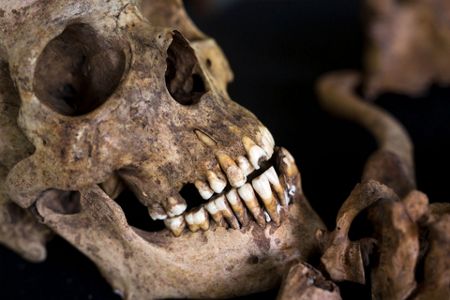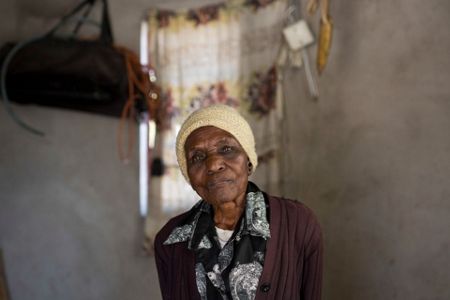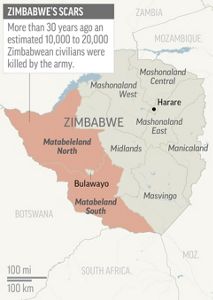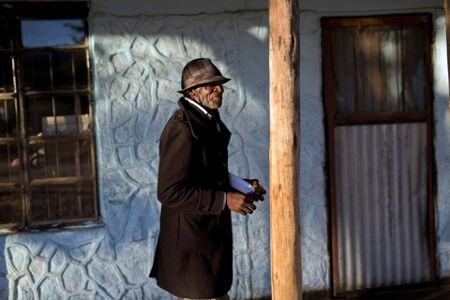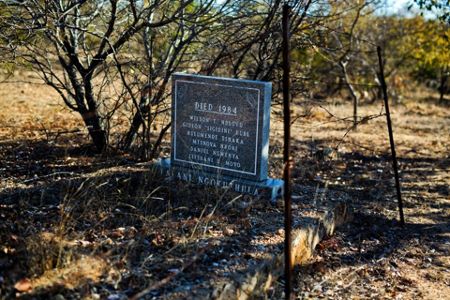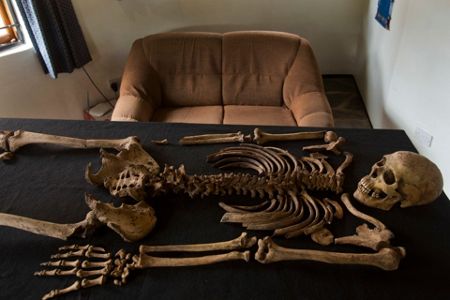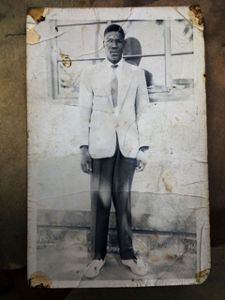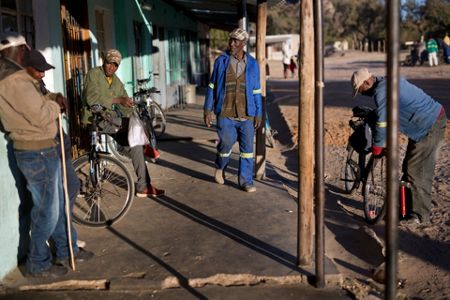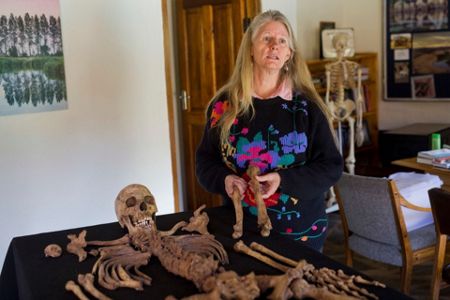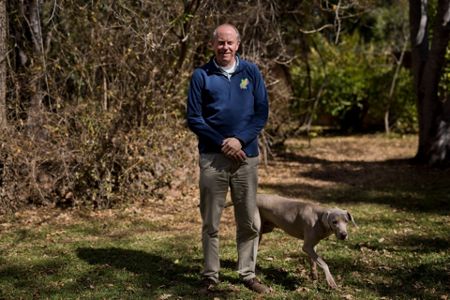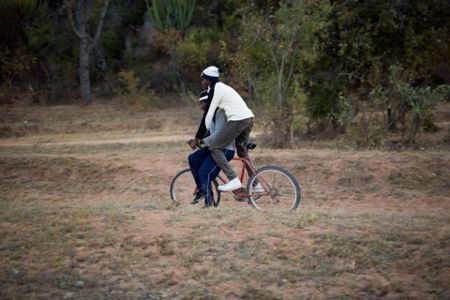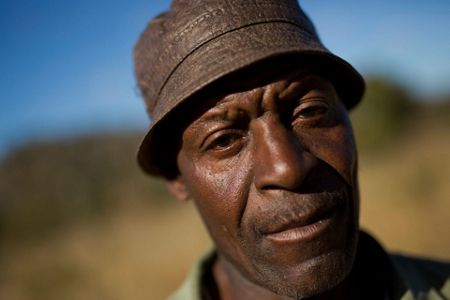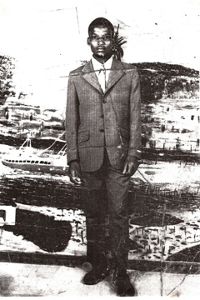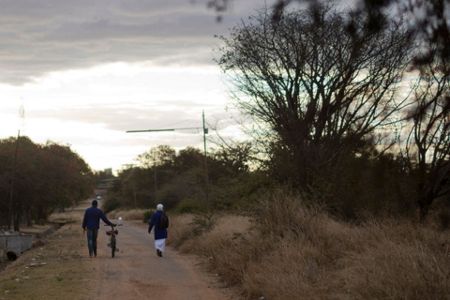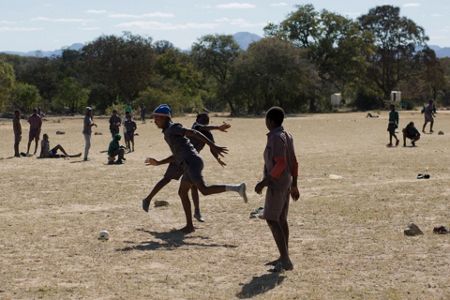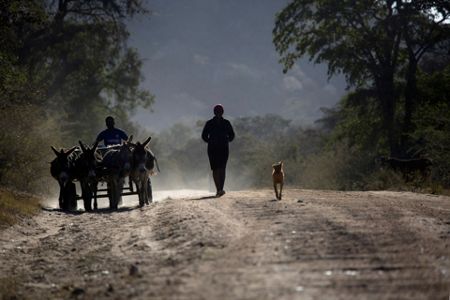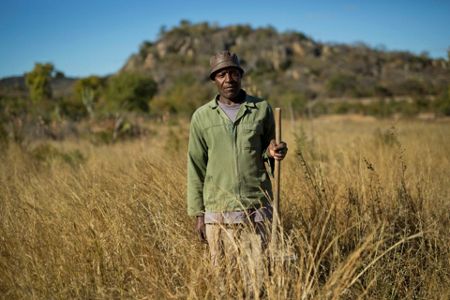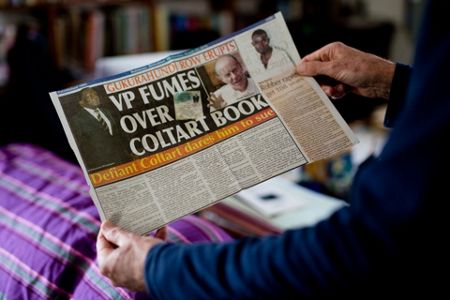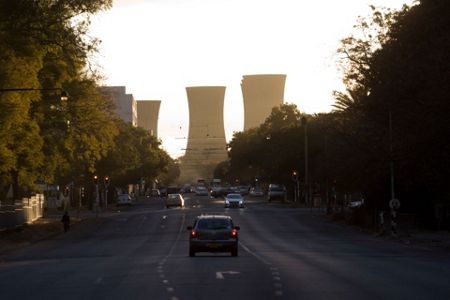SIMBUMBUMBU, Zimbabwe (AP) — Thirty-four years later, Ellis Ndlovu still cannot bear to look at the tree in the schoolyard where Zimbabwean soldiers killed her son.
"They hung him with his legs up and then with his legs down and they were beating him," said Ndlovu, bent over and frail at 91. "They beat him until he died."
Her memories are stronger these days, with the approach of Monday's election in Zimbabwe. The reason: President Emmerson Mnangagwa, the leading candidate, is widely blamed for the army's brutal killings in Matabeleland, which left 10,000 to 20,000 civilians dead.
"I fear that they are going to elect somebody who may repeat the same act," said Ndlovu, speaking in the Ndebele language. "I blame the person who sent those people to kill my child."
The trauma of the Matabeleland massacres is still raw for survivors. Many say they cannot vote for Mnangagwa, who was state security minister at the time.
Days before the polls, Zimbabwe's elections look too close to call. The Ndebele people of Matabeleland, representing about 15 percent of registered voters, could be a decisive vote for the opposition.
Of all the scars from former leader Robert Mugabe's 37-year rule of Zimbabwe, the deepest is the Matabeleland killings. The army's Operation Gukurahundi — "the early rains that blow away the chaff," in the local Shona language — ran from 1983 through 1987, when the Fifth Brigade rampaged through the southwestern provinces of Matabeleland.
The residents of villages were rounded up and forced to attend all-night rallies for Zimbabwe's ruling party, ZANU-PF. Community leaders were beaten and sometimes killed in front of the gatherings. Men, young and old, were forced to dig graves, then shot and buried in them. Survivors were forced to dance on top of the fresh graves, sometimes until the blood of the dead seeped through.
Some families were pushed into huts that were set on fire and they either burned to death or were shot dead when they tried to escape.
The Fifth Brigade consisted of 3,000 troops, virtually all ethnic Shona, who make up about 70 percent of Zimbabwe's population. The brigade received counter-insurgency training by North Korean advisers and was known as the elite praetorian guard of Mugabe, directly answerable to his office. Their arms and uniforms were different from the rest of the army, including their distinctive red berets.
With its prolonged, deadly campaign in Matabeleland, the Fifth Brigade was trying to stamp out rural support for anti-government rebels. Gukurahundi also was viewed by many as an attempt by Mugabe to weaken any opposition to his stated aim of a one-party state.
The army's campaign did not succeed in winning the Ndebele vote for Mugabe in the 1985 polls or succeeding elections. As Zimbabwe goes to the polls again, the Ndebele people of Matabeleland are still viewed as a solid vote against ZANU-PF and its presidential candidate, Mnangagwa.
Zimbabwean opposition politician David Coltart said enduring resentment across Matabeleland will be evident in the elections.
"What we need from Mnangagwa is an admission of what happened, an apology and communal reparations for the victims of that time," said Coltart. "I'm not convinced that prosecuting someone like Mnangagwa is going to heal our nation at this time."
Those at the head of the chain of command have not been held to account. Mugabe never accepted responsibility or apologized for the killings, but he did call them a "moment of madness."
Mnangagwa has also refused to accept responsibility and has opposed a new investigation, saying it would re-open old wounds. Perence Shiri, the head of the Fifth Brigade during the killings, rose in power to become the head of Zimbabwe's Air Force and now is the minister of agriculture, appointed by Mnangagwa.
The most authoritative report on the Matabeleland killings is "Breaking the Silence," published in 1997 by Zimbabwe's Catholic Commission for Justice and Peace and the Legal Resources Foundation, drawing on interviews with more than 1,000 people and many documents.
Much remains to be done to heal the scars of the killings, said Shari Eppel, the report's main author, who continues to do forensic research into the killings as director of the Solidarity Peace Trust.
At her office in Bulawayo, Eppel unwrapped canvas to reveal the skull and bones identified as the remains of a Gukurahundi victim, soon to be given a proper burial.
"Julius Mvulo Nyathi died in 1984, which was when the Fifth Brigade was deployed in Matabeleland South," Eppel said. "We heard that his arms and ankles were tied with wire and he was severely beaten by the Fifth Brigade, soldiers who came in uniforms with red berets and they accused him of being a dissident. ... He also had burning plastic dripped onto his legs and he was then dragged away."
"Nobody actually saw his death, but his body was found in the hills and he was buried in a shallow grave above a secondary school in Matopo district."
Eppel said many in Matabeleland say the region is haunted by "angry dead."
"The angry dead are the people buried in the wrong place and who haven't had the right rituals at the time of their murder and burial," said Eppel. She said hundreds of reburials are needed to assuage families: "People say these angry dead are the ones who make bad things happen in the family and the community, to keep reminding them; 'I'm in the wrong place, I need to come home.'"
Isaia Nkomo, 60, remains unsettled by the death of his brother, Simimba, 36 years ago.
"I was at work and my brother was at home. So they came and took him from our homestead and killed him in the bush," said Nkomo. "We still haven't located the place where here is."
His family, he said, is "not feeling well because we keep thinking about him. Other people's remains have been found and we are still looking for him. He might have been eaten by dogs or some other people removed him and put him somewhere else."
Nkomo said he will not vote for Mnangagwa or ZANU-PF.
"Voting for Mnangagwa, I can't do that because my brother was killed at that time by the people who currently want us to vote for them, those that are in power. I'd rather vote for someone in the opposition."
___
Meldrum reported from Johannesburg.
___
Follow Africa news at https://twitter.com/AP_Africa
Copyright 2018 The Associated Press. All rights reserved. This material may not be published, broadcast, rewritten or redistributed.




